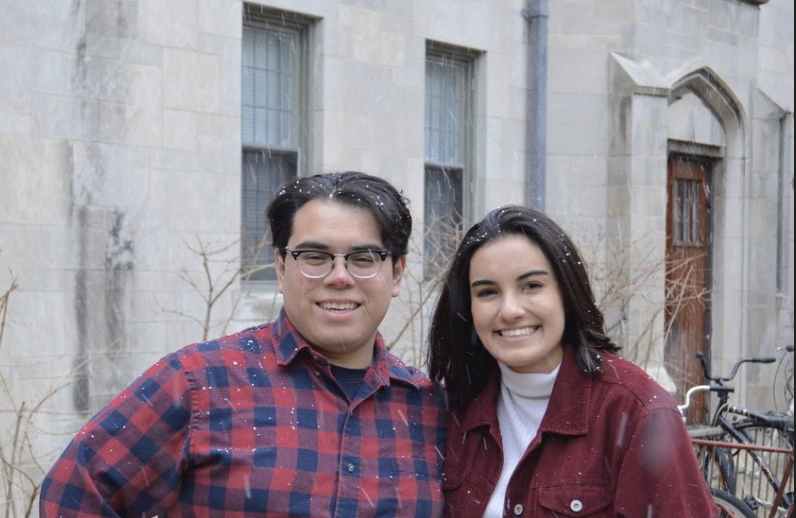A Guide to Associated Student Government; members plan to prioritize diversity, communication and transparency amid COVID-19
Katherine Conte and Juan Zuniga. Zuniga will succeed Conte as ASG president following her resignation.
August 16, 2020
Northwestern’s Associated Student Government comprises the Executive Office, Senate and several committees focused on various areas of the undergraduate experience. ASG operates on a “students first” approach, and is committed to “listening, learning and acting on student needs and wants” according to its mission statement. Here is a guide to ASG and some of its leaders’ major focuses for the upcoming year.
Executive Office
ASG’s Executive Office for the 2020-21 school year includes President Katherine Conte, Executive Vice President Juan Zuniga, Chief of Staff Elizabeth Sperti and Executive Officer of Justice and Inclusion Daniel Rodriguez. The Executive Office has the most direct contact with administrators, and this coming year, executive members have committed to regular communication with the administration around their concerns as well as concerns brought up by the student body.
Sperti said the Executive Office has communicated with the administration more frequently than ever, and its members have prioritized increased communication due to the pandemic. Executive members met with Vice President for Student Affairs Julie Payne-Kirchmeier biweekly throughout the summer and plan to continue these meetings throughout the school year. Executive officers also plan to continue efforts to divest from fossil fuels, push for a student leadership stipend and advocate for transgender students to have their correct names displayed on their WildCARDs, Sperti said.
Senate
ASG’s Senate is made up of elected representatives from undergraduate schools, Greek organizations and student groups. Senators meet weekly to debate various issues across NU’s campus, as well as write and vote on legislation and allocate the Student Activities Assistance Fund. Any student can write legislation, but a senator must co-sponsor it. Passing legislation is a two-week process, where senators debate on it, may amend it and finally vote on whether to implement it.
Committees
ASG committees serve as focus groups on various aspects of NU’s undergraduate experience: Academics, finances, student activities, health and wellness and public relations are just a few. Members of these committees have a range of tasks, from allocating funds and resources to improving facilities on campus to making ASG more accessible to NU’s entire student body. For students who may not want to go the senator route but are still interested in learning more about the inner workings of ASG, committees are a great way to go!
COVID-19 plans
The pandemic has required ASG members to be more open and transparent with the student body than ever before. Not only have committees begun to look into ways to carry out tasks remotely, but ASG has created a COVID-19 task force that serves as a resource for both ASG members and the general student body. Task force members collect information from different student groups and organizers about what students’ needs are and respond to any concerns or issues that may arise due to the pandemic. Like the Executive Office, the COVID-19 task force has regular meetings with administration and is in the process of creating a resource guide for students.
Diversity and inclusion initiatives
This upcoming year, Rodriguez said he wants to center the voices of those in marginalized groups, especially because they have been disproportionately affected by the COVID-19 pandemic. Rodriguez also said he wants to make justice and inclusion work accessible to the entire student body, not solely for transparency, but for the promotion of students’ voices and involvement in initiatives.
The current racial tensions and movements that have developed in the past few months have made diversity and inclusion work all the more necessary, Rodriguez said. ASG has not always been the most welcoming of all student voices and opinions, and has insead served as a means for performative allyship, he added. But Rodriguez said he and other executive members, many of whom hold marginalized identities, are determined to change this narrative by turning performative practices into agenda items.
Email: [email protected]
Twitter: @juliaa_grace
Related Stories:


